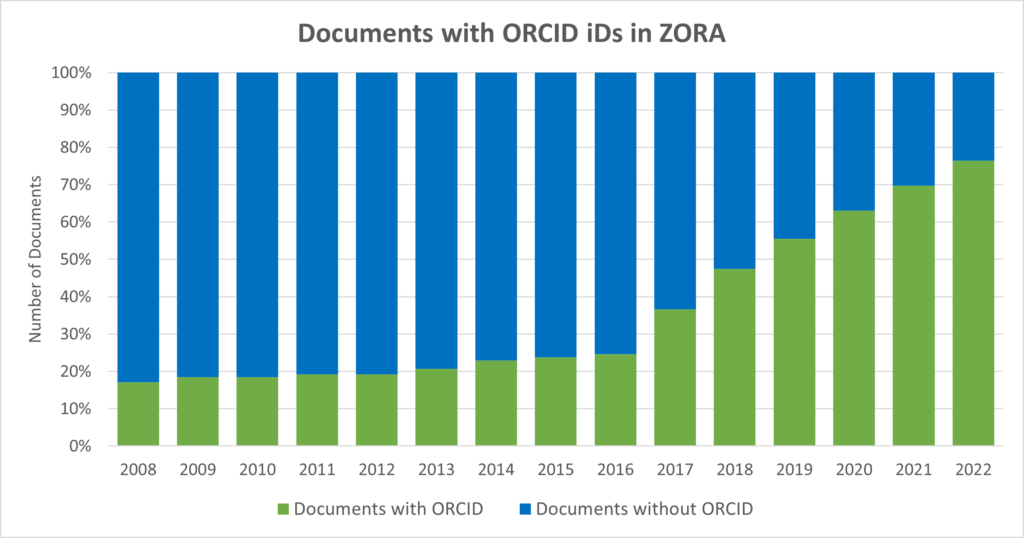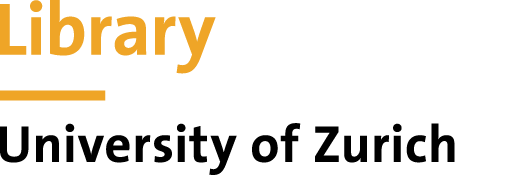
ORCID iD gives visibility to research outputs
Read this post in
 Deutsch
Deutsch
The ORCID iD is an internationally recognized identification number that connects researchers to their research outputs, uniquely associating them with publications, datasets, and software, regardless of name changes, variations in name spelling, or changes in institutional affiliations. The ORCID iD can also be linked to the UZH Repository ZORA.
How do I obtain an ORCID iD?
You can register at https://orcid.org/register using either your personal or professional email address. The registration and management of the ORCID iD are personal and cannot be delegated. ORCID iD can be used throughout your entire career and can be deactivated or reactivated at any time. ORCID iD holders have full control over which data is publicly displayed in their ORCID Record.
How do I add entries to my ORCID Record?
ORCID Records can be automatically or manually adjusted. Entries (publications, datasets) are imported via Crossref, DataCite, Scopus, and other search and linking assistants if the ORCID iD for authorship and a persistent identifier (e.g., DOI) are associated with the publication or dataset. Entries can also be added (and deleted) entirely manually or via search and linking assistants. Additionally, information about employment, education, academic activities, and funding can be manually added to the ORCID Record.
Why use an ORCID iD?
The use of an ORCID iD is cost-free and voluntary and can offer many advantages: a unique attribution of authorship, a better overview of your own research output, increased networking in the scientific publishing world, and easier data exchange between different systems.
This video provides a concise introduction to the reasons for having an ORCID iD.
ORCID is a non-profit organization supported worldwide by over a thousand research institutions (including UZH) and publishers. More and more publishers and research funders, such as the SNF, also require an ORCID iD.
The ORCID iD at UZH
UZH does not necessarily require its researchers to have an ORCID iD but recommends it in its Open Science Policy. With the help of an ORCID iD, researchers can easily record their own publications in ZORA, the institutional repository.
ZORA integrates the ORCID iD, allowing researchers to import their publications directly from the ORCID Record into ZORA or export them from ZORA to ORCID. In order to use these functionalities, the publications in the repository must be linked to an ORCID iD. To import from the ORCID record to ZORA, select “Manage deposits” (in the Submitter role) and “Orcid Import” as the import source. You can then select the publications to be imported from the ORCID record via “Search”. To export the publications from ZORA, select the “My publications / Export” tab in the ORCID menu of ZORA and click on the “Search” button. All publications to be exported can then be selected and exported with “Export selected entries”. The current UZH membership with ORCID does not allow publications to be automatically synchronized between ORCID and ZORA (and vice versa).
Still unsure? You can learn more about how to link your ORCID iD in ZORA in our tutorial and get even more information in the FAQs.
Data from ZORA indicates that the use of ORCID iDs has increased in recent years (see Figure 1). This data comes from the UZH Open-Access Monitor and has been filtered for documents in ZORA where at least one of the author has an ORCID iD. This number has also increased because publishers increasingly provide ORCID iDs in their metadata in imports to ZORA.

HOPE, the UZH’s own publication platform for Open Access journals, also supports the inclusion of ORCID iDs.
The ORCID iD at the SNSF
When submitting a project to the Swiss National Science Foundation, a CV is required in which the applicants must provide their ORCID iD. The SNSF also recommends that the most current and important works are recorded in the ORCID Record. More information can be found on the SNSF’s website.
Melanie Röthlisberger, Open Science Services

Comments are closed, but trackbacks and pingbacks are open.